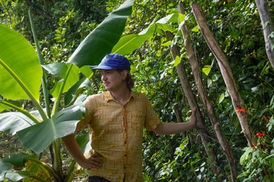
Sur Futuro
Agroforestry Plan
In a USAID Farmer-to-Farmer assignment in the Dominican Republic, I collaborated with Sur Futuro, the Ministry of Energy and Mines, and Partners of the Americas to improve watershed management in the province of Azua. Over two weeks, I worked with farmers and technical advisors to develop site-specific agroforestry interventions that enhance water quality, reduce erosion, and provide economic incentives for adoption.

As the "agroforestry design expert," I worked alongside Emma Thornton (agroforestry management expert) during our assignment. Together, we consulted with Sur Futuro to assess farming practices across seven zones, deliver workshops for technical advisors, and design interventions that integrate ecological restoration with tangible economic benefits for local farmers.
To reach these farmers, we had to travel deep into the mountainous countryside, crossing rivers and navigating rugged terrain. These remote communities are located in critical watershed areas, and their distance from urban centers underscores the importance of bringing tailored, sustainable agricultural solutions directly to them.


We supported farmers in enhancing multi-tiered food forests by encouraging the incorporation of high-value tree crops, like avocados, alongside coffee, a cash crop in much of the region. This layered approach improves biodiversity, boosts income potential, and strengthens soil health, all while optimizing shade and resource use to benefit the entire system. These practices also position farmers to qualify for carbon credits and rainforest alliance certification, unlocking new market opportunities
Much of our work focused on integrating livestock more effectively into orchard systems to enhance sustainability and productivity. We promoted strategies such as rotational grazing, introducing high-protein forage trees like moringa, and implementing erosion control measures. These interventions aim to improve soil health, reduce feed costs, and create a more harmonious balance between livestock and crop production.


We consulted with farmers to blend their deep understanding of the land with technical practices, creating solutions tailored to their specific challenges. While many of these ideas are promising in theory, they often flounder in practice without careful consideration of the details. By addressing practical factors and local context, we worked to ensure these interventions would be both relevant and successful.
We also worked with a group of agronomy students at a local technical school, introducing them to agroforestry concepts. The session focused on more holistic land management, aiming to inspire the next generation of farmers and technical advisors to consider both ecological and economic factors in their work.


Many of the sites we visited featured reservoirs, which were supplied with water using solar-powered infrastructure provided by Sur Futuro. These reservoirs offer the potential for "aquaforestry," integrating fish production into irrigation systems. This approach combines nutrient management, as fish waste enriches water for crops, with an additional revenue stream from fish sales, helping farmers reduce input costs and diversify income sustainably.
Soil erosion is a significant challenge in these mountainous farming communities, but solutions like vetiver grass and increased soil organic matter offer effective mitigation. Strategically planting vetiver on contour stabilizes slopes, traps sediment, and improves water infiltration, while building soil organic matter enhances soil structure, making it more resistant to erosion.


To battle pests like broca and diseases like roya more effectively, we promoted integrated pest management strategies. These include the use of natural pesticides, improved pruning techniques to increase airflow, using improved varieties of crops, fostering biodiversity to attract beneficial predators, and the sterilization of crop waste, through composting, to reduce the spread of pests and disease. By minimizing the need for chemical use, farmers can position their farms for organic certification, opening access to premium European export markets.

















